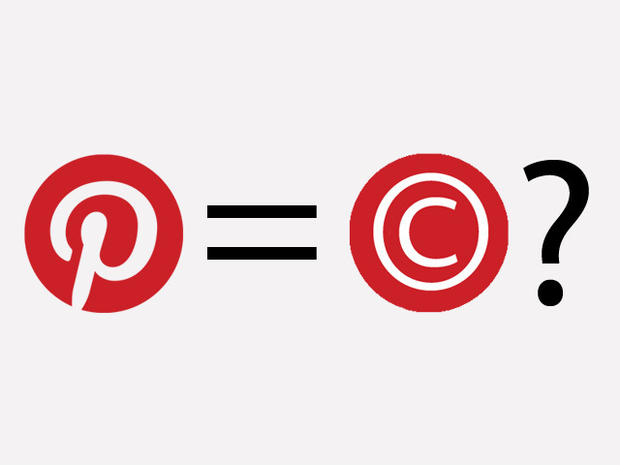Pinterest tightens copyright rules
(MoneyWatch) Online image-posting service Pinterest has entered that rarefied high-tech domain of social networks with plenty of buzz, lots of users, and ample venture capital funding ($37.5 million to date). In another boost for the startup, name corporate brands such as Procter & Gamble (PG), The Wall Street Journal, Land's End, and Whole Foods (WFM) also use the service for marketing.
One thing -- Pinterest's revenue might make some paperboys sneer in disdain. In keeping with the current fashion in tech, until now the company has focused on acquiring users rather than on making money. That will have to change, of course, if only to satisfy Pinterest's financial backers.
VIDEO: What is Pinterest?
Interest spikes in Pinterest
Pinterest secretly swaps links for profits
To that end, Pinterest has more recently geared up to monetize traffic, as TechCrunch's Colleen Taylor reports. Unfortunately, given that consumers are putting masses of copyrighted photos onto their boards, that becomes a problem. After all, Pinterest doesn't want to take the legal heat for making coin on the backs of someone else's intellectual property, so it's always made users responsible for posting only that which they had a right to use. But an update of its terms of service late on Friday made that abundantly clear.
It's about the money
Internet-based companies that welcome consumer-supplied content typically require users to post only that to which they have a legal right. Such requirements are one basis for protection under U.S. copyright law, so rights-holders that find their material posted without permission can't automatically sue a website or social network for infringement. So long as a company isn't inviting people to post copyrighted images, written material, and video without permission from third parties and take down allegedly infringing material, it can operate in relatively safety. Two years ago, Viacom (VIAB) lost its lawsuit against YouTube on exactly such "safe harbor" grounds.
Some copyright holders regularly prowl for infringing uses of their property. But most are focused on websites and social networks that actually seem to make money off the material, as Taylor's interview with Jonathan Klein, CEO of stock photography service Getty Images, shows;
That's where Pinterest could have some problems. As the company increasingly focuses on profits, intellectual property owners will increasingly pay attention to Pinterest's activities. As Klein said:
The success of sites which are very picture-heavy, like Facebook or Pinterest, the amount of traffic that those sites have, proves that there's a huge attraction in imagery. ... So we want imagery to be out there. We want people to be able to play with imagery, use imagery, pass imagery around, share imagery, which is why we like some of these new apps which make it so easy to do that. So that's why w e don't make it hard [to share images]. However, when somebody's using an image for commercial purposes, to build their business or make money, then we say, "Come on, you've got to share that with the intellectual property owner."
Pointing the finger
Realistically, Pinterest has to expect users to upload only that content which could pass muster -- both for legal protection and because it would be completely impossible for the company to vet every image pinned to its service. However, the old terms of use wording could have been seen as a touch obscure to many:
You acknowledge and agree that you are solely responsible for all Member Content that you make available through the Site, Application and Services. Accordingly, you represent and warrant that: (i) you either are the sole and exclusive owner of all Member Content that you make available through the Site, Application and Services or you have all rights, licenses, consents and releases that are necessary to grant to Cold Brew Labs the rights in such Member Content, as contemplated under these Terms; and (ii) neither the Member Content nor your posting, uploading, publication, submission or transmittal of the Member Content or Cold Brew Labs' use of the Member Content (or any portion thereof) on, through or by means of the Site, Application and the Services will infringe, misappropriate or violate a third party's patent, copyright, trademark, trade secret, moral rights or other proprietary or intellectual property rights, or rights of publicity or privacy, or result in the violation of any applicable law or regulation.A little stiff going for the average reader. If someone finds a post pulled down, Pinterest will want to be able to point to clear language that the user accepted that explains the responsibility. Here's the new version:
Pinterest values and respects the rights of third party creators and content owners, and expects you to do the same. You therefore agree that any User Content that you post to the Service does not and will not violate any law or infringe the rights of any third party, including without limitation any Intellectual Property Rights (defined below), publicity rights or rights of privacy. We reserve the right, but are not obligated, to remove User Content from the Service for any reason, including User Content that we believe violates these Terms or the Pinterest Acceptable Use Policy. It is important that you understand that you are in the best position to know if the materials you post are legally allowed. We therefore ask that you please be careful when deciding whether to make User Content available on our Service, including whether you can pin or re-pin User Content on your boards. To learn more about copyright and fair use, please click here for some links to useful third party resources.The links are a smart addition, because many people have no concept of what copyright actually entails and assume that anything on the Web is fair game.
Pinterest still has one problem -- getting people to actually read its terms of use and then click the links so they understand what they're agreeing to. Maybe the company can pin it on each user's board as a friendly reminder.
